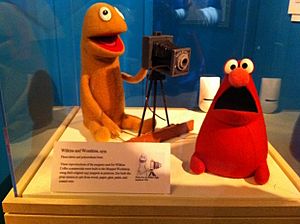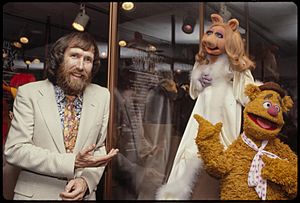Jim Henson facts for kids
Quick facts for kids
Jim Henson
|
|
|---|---|
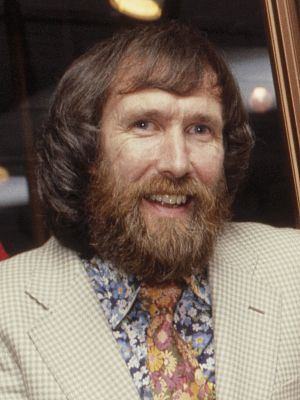
Henson in 1979
|
|
| Born |
James Maury Henson
September 24, 1936 Greenville, Mississippi, U.S.
|
| Died | May 16, 1990 (aged 53) New York City, U.S.
|
| Cause of death | Toxic shock syndrome |
| Resting place | Cremated; ashes scattered in Taos, New Mexico |
| Alma mater | University of Maryland, College Park (BS) |
| Occupation |
|
| Years active | 1954–1990 |
| Board member of |
|
| Spouse(s) | |
| Children |
|
| Awards |
|
Jim Henson (born James Maury Henson; September 24, 1936 – May 16, 1990) was a super creative American artist. He was a puppeteer, animator, cartoonist, actor, inventor, and filmmaker. He became famous worldwide for creating The Muppets and Fraggle Rock. He also directed movies like The Dark Crystal (1982) and Labyrinth (1986). Jim was born in Greenville, Mississippi, and grew up in both Leland, Mississippi, and University Park, Maryland.
Jim started making puppets when he was in high school. While studying at the University of Maryland, College Park, he created a short TV show called Sam and Friends (1955–1961). He worked on this show with Jane Nebel, who later became his wife. After college, Jim and Jane made TV commercials and experimental films. In 1958, they started a company called Muppets, Inc., which later became The Jim Henson Company.
In 1969, Jim joined the children's TV show Sesame Street. He helped create many beloved Muppet characters for the show. He and his team also appeared on the first season of Saturday Night Live. Later, he produced The Muppet Show (1976–1981). He became well-known for characters like Kermit the Frog, Rowlf the Dog, and Ernie. In his later years, he started the Jim Henson Foundation and Jim Henson's Creature Shop. He won two Emmy Awards for his work on The StoryTeller (1987–1988) and The Jim Henson Hour (1989).
Jim Henson passed away in New York City on May 16, 1990, at age 53. He died from a very serious bacterial infection. At the time, he was talking about selling his company to The Walt Disney Company, but these talks stopped after his death. Jim received a star on the Hollywood Walk of Fame in 1991. He was also named a Disney Legend in 2011.
Contents
Jim Henson's Early Life and Creative Beginnings
Growing Up and Discovering Puppets: 1936–1960
Jim Henson was born on September 24, 1936, in Greenville, Mississippi. He was the younger of two children. His father, Paul Ransom Henson, worked with plants for the government. Jim's older brother, Paul Jr., died in a car crash in 1956. Jim grew up in Leland, Mississippi, and later moved to University Park, Maryland.
Jim remembered getting his family's first television as a big event. He was very inspired by radio ventriloquist Edgar Bergen and early TV puppets like those on Kukla, Fran and Ollie.
At 18, Jim started working at a TV station called WTOP-TV in 1954. He made puppets for a children's show called The Junior Morning Show. After high school, he went to the University of Maryland, College Park. He first studied art, thinking he might become a commercial artist. But a puppetry class helped him discover his true passion. He graduated in 1960 with a degree in home economics.
As a freshman, Jim created Sam and Friends, a five-minute puppet show for WRC-TV in Washington, D.C. The characters on Sam and Friends were early versions of the Muppets. This show even included a first version of Kermit the Frog. Jim worked at WRC from 1954 to 1961.
On Sam and Friends, Jim started trying new ways to use puppets on TV. He used the camera frame to let puppeteers work out of sight. He believed TV puppets needed to feel "alive and sensitive." So, he began making characters from soft, fabric-covered foam rubber. This allowed them to show more feelings than older, wooden puppets. Instead of strings, he used rods to move his Muppets' arms, giving him better control. He also wanted the Muppets to "speak" more realistically. He made their mouths move precisely with the words.
When Jim started Sam and Friends, he asked Jane Nebel, a fellow student, to help him. The show was a success. After college, Jim traveled in Europe. He was inspired by European puppeteers who saw their work as a true art form. After returning to the U.S., he began dating Jane, and they later married.
Expanding the Muppet World
TV Shows and Commercials: 1961–1969
For the next two decades, Jim worked on commercials, talk shows, and children's projects. He wanted the Muppets to be "entertainment for everybody." His work on Sam and Friends led to many guest appearances on TV talk and variety shows. He appeared on shows like The Steve Allen Show and The Ed Sullivan Show. These appearances made him much more famous. His characters then appeared in hundreds of commercials in the 1960s.
One of Jim's most popular commercial series was for Wilkins Coffee. These ads usually showed two Muppets, Wilkins and Wontkins. Wilkins would praise the coffee, while Wontkins would say he hated it. Then, Wilkins would playfully hit Wontkins with things like a hammer or a pie. Jim explained that they tried to sell products by making people laugh.
These short, seven-second Wilkins commercials were a big hit. They were later remade for other coffee companies. The characters were so good at selling coffee that other companies wanted them too. They promoted products like bread, gas stations, and drinks. Over 300 "Wilkins and Wontkins" commercials were made.
In 1963, Jim and Jane moved to New York City, where their company, Muppets, Inc., was located. Jane stopped performing to raise their children. Jim then hired writer Jerry Juhl in 1961 and puppet performer Frank Oz in 1963. Jim said they both helped create much of the Muppets' humor and characters. Jim and Frank became very close friends and a great performing team. Their teamwork was clear in characters like Bert and Ernie, Kermit and Miss Piggy, and Kermit and Fozzie Bear. More performers joined Jim's team over the years, including Jerry Nelson and Dave Goelz.
From 1963 to 1966, Jim explored filmmaking. He made a series of experimental films. His nine-minute film Time Piece was nominated for an Academy Award for Best Live Action Short Film in 1966. He also made The Cube in 1969.
Jim continued to work with companies for advertising. His clients included Frito-Lay, which featured an early version of Cookie Monster to promote their snacks.
Joining Sesame Street: 1969
In 1969, TV producer Joan Ganz Cooney and her team at the Children's Television Workshop were very impressed by Jim Henson's work. They asked Jim and his team to work full-time on Sesame Street. This children's show first aired on November 10, 1969. A part of the show was for funny, colorful puppet characters living on Sesame Street. These included Grover, Cookie Monster, Bert and Ernie, Oscar the Grouch, and Big Bird. Jim performed characters like Ernie, game-show host Guy Smiley, and Kermit, who was a TV news reporter.
At first, Jim's Muppets appeared separately from the realistic parts of the show. But the show was changed to mix them together, focusing more on Jim's work. Joan Ganz Cooney often praised Jim's work. The success of Sesame Street also allowed Jim to stop making commercials, which he was happy about.
Jim also helped produce other parts of the show, like counting films for numbers 1 through 10. He directed the original "C Is For Cookie" song. He also made Tales from Muppetland, a short series of TV movie specials. These were funny versions of classic fairy tales for young audiences, hosted by Kermit the Frog. The series included Hey, Cinderella! and The Frog Prince.
Reaching a Wider Audience: 1970–1978
Jim, Frank Oz, and their team worried that people only saw them as making children's entertainment. So, they aimed for an adult audience with sketches on the late-night show Saturday Night Live. Jim liked the show, but he felt that his ideas and the writers' ideas for the Muppets didn't quite fit together.
Jim then started to develop a Broadway show and a weekly TV series for the Muppets. American TV networks rejected the series in 1976. They thought Muppets would only appeal to kids. So, Jim pitched the show to a British producer named Lew Grade. Grade agreed to fund the show, which would be filmed in the United Kingdom and shown worldwide. That same year, Jim moved his team to England, and The Muppet Show began filming.
The show featured Kermit as the host and many other characters like Miss Piggy, Gonzo the Great, and Fozzie Bear. Jim's teammates sometimes compared his role to Kermit's. They saw him as a shy, kind boss who ran things like "an explosion in a mattress factory." Jim saw Kermit as a part of himself, but he thought Kermit was braver. He once said Kermit "can say things I hold back."
Jim Henson's Films and Later Projects
Moving to the Big Screen: 1979–1986
The Muppets starred in their first movie, The Muppet Movie, in 1979. It was a big success with both critics and audiences. Jim's hero, Edgar Bergen, died during the making of the film, and Jim dedicated it to him. Jim, as Kermit, sang "The Rainbow Connection" in the movie. This song became very popular and was nominated for an Academy Award.
Jim then directed The Great Muppet Caper (1981). After this, he decided to end The Muppet Show to focus on making films. However, the Muppet characters still appeared in TV movies and specials.
Jim also helped other filmmakers. For The Empire Strikes Back (1980), George Lucas asked Jim to help create and move the character Yoda. Lucas wanted Jim to be Yoda's puppeteer, but Jim suggested Frank Oz instead. Frank Oz performed Yoda and continued to do so in later Star Wars films.
In 1982, Jim started the Jim Henson Foundation. This foundation helps promote and develop the art of puppetry in the United States. Around this time, he began making darker, more realistic fantasy films that did not feature the Muppets. He co-directed The Dark Crystal (1982) with Frank Oz. They wanted to create a sense of realism with creatures that seemed truly alive. The puppets in The Dark Crystal were based on art by Brian Froud. The film won several awards. It wasn't a huge hit in theaters but became very popular later when released on video.
Also in 1982, Jim co-founded Henson International Television. This company distributed TV shows for children, teens, and families.
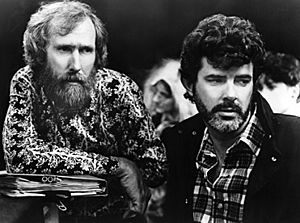
Frank Oz directed The Muppets Take Manhattan (1984). Jim then directed Labyrinth (1986) by himself. This fantasy film received some good reviews, but it didn't do well at the box office. This made Jim feel down. His son, Brian Henson, said it was the closest he saw his father to being depressed. However, Labyrinth later became a cult classic, loved by many fans.
In 1984, Jim visited Moscow to make a film about the famous Russian puppeteer Sergey Obraztsov. To prepare, Jim had studied Russian for a year. He also gave four puppets to the Moscow Museum of Obraztsov Puppets.
Final Creative Years: 1987–1990
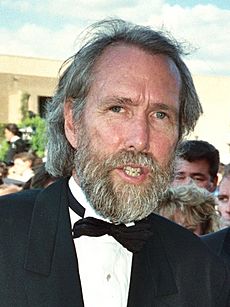
Jim continued to create children's TV shows like Fraggle Rock and the animated Muppet Babies. He also explored more grown-up themes with The StoryTeller (1988), which was based on folklore and myths. This show won an Emmy for Outstanding Children's Program. The next year, he returned to TV with The Jim Henson Hour. It was praised by critics and won him another Emmy, but it was canceled after 12 episodes due to low ratings. Jim felt this was because NBC kept changing its schedule.
In late 1989, Jim started talking about selling his company and characters (except those from Sesame Street) to The Walt Disney Company. He hoped this would allow him to spend more time on the creative side of things. By 1990, he had finished a TV special called The Muppets at Walt Disney World and an attraction for Disney's Hollywood Studios called Muppet*Vision 3D. He was also working on new film ideas and a TV series called Muppet High.
Jim Henson's Personal Life
Jim Henson married Jane Nebel in 1959. They had five children: Lisa (born 1960), Cheryl (born 1961), Brian (born 1963), John (1965–2014), and Heather (born 1970). Jim and Jane separated in 1986, but they remained close friends. Jane said that Jim was so busy with his work that he had little time for her or their children. All five of his children started working with Muppets when they were young. Cheryl said this was because "one of the best ways of being around him was to work with him." Jim strongly supported the civil rights movement.
Illness and Passing
Jim Henson's last TV appearance was with Kermit on The Arsenio Hall Show on May 4, 1990. He told his publicist he was tired and had a sore throat, but thought it would go away. On May 12, 1990, Jim traveled to North Carolina with his daughter Cheryl to visit his father. They returned to New York City the next day. Jim canceled a Muppet recording session planned for May 14. His wife visited him that night.
Jim had trouble breathing when he woke up on May 15, 1990. He agreed to go to the emergency room at New York–Presbyterian Hospital. X-rays showed serious infections in both of his lungs. Jim was put on a breathing machine, but his condition quickly worsened. He passed away at 1:21 a.m. the next morning, May 16, 1990. He was 53 years old.
Doctors announced that Jim died from a severe bacterial infection that led to organ failure. They noted that he might have been saved if he had gone to the hospital just a few hours earlier.
Remembering Jim Henson
News of Jim Henson's death spread quickly, and people around the world shared their sadness and tributes. Many of his co-stars and directors from Sesame Street and the Muppets also shared their thoughts.
On May 21, 1990, a public memorial service for Jim was held in Manhattan. Another service took place on July 2, 1990, in London. Jim had wished that no one wear black at his service. The Dirty Dozen Brass Band played "When the Saints Go Marching In" at the end. Harry Belafonte sang "Turn the World Around," a song he first sang on The Muppet Show. Everyone in the church waved colorful foam butterflies on puppet rods. Later, Big Bird (performed by Caroll Spinney) walked onto the stage and sang Kermit's famous song "Bein' Green" while trying not to cry. Jim's fellow puppeteers, including Dave Goelz and Frank Oz, sang a mix of Jim's favorite songs in their characters' voices. They ended with "Just One Person" while performing their Muppets. The funeral was described as a very moving event. Jim was cremated, and his ashes were scattered near Taos, New Mexico in 1992.
Jim Henson's Lasting Legacy
The Jim Henson Company and the Jim Henson Foundation continued their work after Jim's death. They produced new shows and specials. Jim Henson's Creature Shop also keeps creating characters and special effects for many projects. Steve Whitmire, who joined the Muppets in 1978, began performing Kermit the Frog six months after Jim's death. Later, Matt Vogel took over the role of Kermit.
Sesame Workshop bought the Sesame Street characters in 2000. On February 17, 2004, the Muppets and Bear in the Big Blue House were sold to the Walt Disney Company.
One of Jim's last projects was the attraction Muppet*Vision 3D. It opened at Disney's Hollywood Studios on May 16, 1991, exactly one year after he passed away. The Jim Henson Company still owns the Creature Shop and its film and TV library. This includes shows like Fraggle Rock, Farscape, The Dark Crystal, and Labyrinth. A book about his life, Jim Henson: The Biography, was released on what would have been his 77th birthday, September 24, 2013.
The Academy Film Archive holds a collection of Jim Henson's film work.
Today, Jim's characters are performed by new puppeteers. These include Matt Vogel (Kermit), Peter Linz (Ernie), Eric Jacobson (Guy Smiley), Dave Goelz (Waldorf), and Bill Barretta (Rowlf the Dog, The Swedish Chef).
In 2019, the YouTube channel Defunctland released a six-part series about Jim Henson's life. A movie about Jim's life, called Muppet Man, has been planned by Walt Disney Pictures and The Jim Henson Company. In 2022, it was announced that Ron Howard plans to direct a documentary about Jim's life, with the full help of the Henson family.
Tributes to Jim Henson
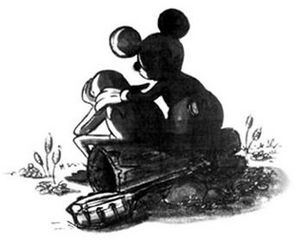
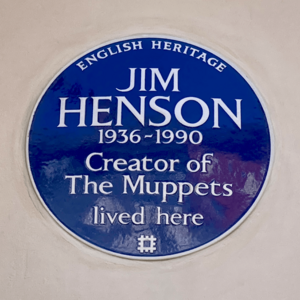
- In 1971, a student group at the University of Maryland was named the Jim Henson Chapter. The university's library also had an exhibit about Jim Henson's time there from 2019 to 2020.
- Jim Henson is honored on the Hollywood Walk of Fame both as himself and as Kermit the Frog. Only a few other people have received this double honor. He was added to the Walk of Fame in 1991.
- Jim received an honorary degree from Fordham University in 1982.
- He was inducted into the Television Hall of Fame in 1987.
- The theater and arts academy at his old high school, Northwestern High School, is named in his honor.
- Jim Henson is featured in The American Adventure at Epcot in Walt Disney World Resort.
- The Jim Henson Exhibit in Leland, Mississippi, shows original Muppet characters and a statue of Kermit.
- The 1990 TV special The Muppets Celebrate Jim Henson allowed the Muppets themselves to honor Jim.
- A song called "A Boy and His Frog" by Tom Smith, which was a tribute to Henson, won an award in 1991.
- In 2003, students at the University of Maryland, College Park paid for a life-size statue of Jim Henson and Kermit the Frog. It was placed outside the student union on Jim's 67th birthday.
- In 2005, the U.S. Postal Service released stamps honoring Jim Henson and the Muppets.
- On August 9, 2011, Jim Henson was given the Disney Legends Award after his death. Kermit the Frog and Rowlf the Dog performed "The Rainbow Connection" to honor him.
- On September 24, 2011, which would have been Jim's 75th birthday, his hometown of Leland, Mississippi, renamed a bridge "The Rainbow Connection." He was also honored with a Google doodle that day.
- The Center for Puppetry Arts in Atlanta opened a gallery of Muppets exhibits in 2015.
- In July 2016, Hyattsville, Maryland put up a memorial to Jim Henson in Magruder Park.
- The Jim Henson Exhibition: Imagination Unlimited is a traveling exhibit that shows over 300 items from Jim's career. It has been shown in many cities across the U.S.
- In 2018, the American Banjo Museum added Jim Henson to its hall of fame. This was for his positive way of showing the banjo in his shows and The Muppet Movie.
- In 2020, the song "Rainbow Connection" from The Muppet Movie was chosen to be kept in the National Recording Registry. This means it is important to American culture.
- On September 7, 2021, a blue plaque was put on Jim Henson's former home in London to honor his creativity.
- An area at NBC's Rockefeller Center in New York City includes pipes that Jim Henson and his team painted in 1964. This artwork has been preserved and is now part of the studio tour.
Jim Henson's Filmography
Movies
| Year | Film | Director | Producer | Screenwriter | Actor | Role | Notes |
|---|---|---|---|---|---|---|---|
| 1965 | Time Piece | Yes | Yes | Yes | Yes | Man | Short film |
| 1979 | The Muppet Movie | No | Yes | No | Yes | Kermit the Frog Rowlf the Dog Dr. Teeth Waldorf Swedish Chef Additional Muppets |
|
| 1981 | The Great Muppet Caper | Yes | No | No | Yes | Kermit the Frog Rowlf the Dog Dr. Teeth Waldorf Swedish Chef The Newsman Additional Muppets |
|
| 1982 | The Dark Crystal | Yes | Yes | Story | Yes | Jen skekZok/The Ritual Master skekSo/The Emperor |
Puppeteering only Co-directed with Frank Oz |
| 1984 | The Muppets Take Manhattan | No | Executive | No | Yes | Kermit the Frog Rowlf the Dog Dr. Teeth Waldorf Swedish Chef The Newsman Ernie Additional Muppets |
|
| 1985 | Into the Night | No | No | No | Yes | Man on the phone | Cameo |
| Sesame Street Presents: Follow That Bird | No | No | No | Yes | Kermit the Frog Ernie |
||
| 1986 | Labyrinth | Yes | No | No | No | ||
| 1990 | The Witches | No | Yes | No | No | ||
| 1991 | Muppet*Vision 3D | Yes | No | No | Yes | Kermit the Frog Waldorf The Swedish Chef |
3D film attraction at Disney's Hollywood Studios, released after his death |
Television Shows
| Year | Film | Director | Producer | Screenwriter | Actor | Role | Notes | |
|---|---|---|---|---|---|---|---|---|
| 1954 | The Junior Morning Show | No | No | No | Yes | Pierre the French Rat Additional Muppets |
aired on WTOP-TV | |
| Saturday | No | No | No | Yes | Additional Muppets | |||
| 1955–1956 | Afternoon with Inga | No | No | No | Yes | Additional Muppets | aired on WRC-TV | |
| 1955 | In Our Town | No | No | No | Yes | Sam Kermit Yorick Additional Muppets |
||
| 1955–1961 | Sam and Friends | Yes | No | Yes | Yes | Sam Harry the Hipster Kermit Professor Madcliffe Omar Yorick Pierre the French Rat Additional Muppets |
||
| 1956 | Footlight Theater | No | No | No | Yes | Sam Additional Muppets |
||
| 1962 | Tales of the Tinkerdee | No | Yes | Yes | Yes | Kermit the Frog Additional Muppets |
Unaired Pilot available on YouTube |
|
| 1963–1966 | The Jimmy Dean Show | No | No | No | Yes | Rowlf the Dog | ||
| 1969 | The Cube | Yes | Yes | Yes | No | |||
| The Wizard of Id test pilot | No | Yes | No | Yes | Additional Muppets | Pilot available on YouTube | ||
| Hey, Cinderella! | Yes | No | No | Yes | Kermit the Frog Additional Muppets |
|||
| 1969–1990 | Sesame Street | Yes | No | Yes | Yes | Ernie Kermit the Frog Guy Smiley Mahna Mahna Dan Henry Lance Captain Vegetable Mr. Nose The King Stan Harold Happy Sammy the Snake Additional Muppets |
||
| 1970 | The Muppets on Puppets | No | Yes | No | Yes | Himself Rowlf the Dog Kermit Additional Muppets |
Executive Producer Filmed in 1968 |
|
| 1971 | The Frog Prince | Yes | Yes | No | Yes | Kermit the Frog Additional Muppets |
||
| 1972 | The Muppet Musicians of Bremen | Yes | Yes | No | Yes | Kermit the Frog Additional Muppets |
||
| 1974 | The Muppets Valentine Show | Yes | Yes | No | Yes | Wally Kermit the Frog Rowlf the Dog Ernie Additional Muppets |
Executive Producer | |
| 1976–1981 | The Muppet Show | No | Yes | Yes | Yes | Kermit the Frog Rowlf the Dog Dr. Teeth Waldorf The Swedish Chef Link Hogthrob The Newsman Additional Muppets |
||
| 1977 | Emmet Otter's Jug-Band Christmas | Yes | Yes | No | Yes | Kermit the Frog Harvey Beaver Howard Snake Mayor Harrison Fox |
Television film | |
| 1978 | Christmas Eve on Sesame Street | No | No | No | Yes | Kermit the Frog Ernie |
||
| 1983–1987 | Fraggle Rock | Yes | Yes | Yes | Yes | Cantus the Minstrel Convincing John |
Executive Producer | |
| 1983 | Big Bird in China | No | No | No | Yes | Ernie | Television film | |
| Don't Eat the Pictures | No | No | No | Yes | ||||
| 1985 | Little Muppet Monsters | No | No | No | Yes | Kermit the Frog (live-action puppet only) Dr. Teeth |
||
| 1986 | The Muppets: A Celebration of 30 Years | No | Yes | No | Yes | Kermit the Frog Rowlf the Dog Dr. Teeth Waldorf The Swedish Chef Link Hogthrob Ernie Harry the Hipster The Newsman Additional Muppets |
Television film Executive Producer |
|
| The Tale of the Bunny Picnic | Yes | Yes | No | Yes | The Dog | Television film | ||
| The Christmas Toy | No | Yes | No | Yes | Jack-in-the-Box Kermit the Frog |
|||
| 1987–1988 | The StoryTeller | No | Yes | No | No | Executive Producer | ||
| 1987 | Fraggle Rock: The Animated Series | No | Yes | No | No | |||
| A Muppet Family Christmas | No | Yes | No | Yes | Kermit the Frog Rowlf the Dog Dr. Teeth Waldorf Swedish Chef The Newsman Ernie Guy Smiley Baby Kermit Baby Rowlf Additional Muppets |
Television film Executive Producer |
||
| 1988 | Sing-Along, Dance-Along, Do-Along | No | Yes | No | Yes | Rowlf the Dog Penguins Kermit the Frog |
Entry in the Play-Along Video series Executive Producer |
|
| 1984–1991 | Muppet Babies | No | Yes | No | No | Executive Producer | ||
| 1989 | Sesame Street... 20 Years & Still Counting | No | Yes | No | Yes | Ernie Kermit the Frog Additional Muppets |
Television film Executive Producer |
|
| The Jim Henson Hour | Yes | Yes | No | Yes | Himself Kermit the Frog Rowlf the Dog Additional Muppets |
Executive Producer | ||
| 1990 | The Earth Day Special | Yes | No | No | Yes | Kermit the Frog | segment: "Kermit the Frog" | |
| The Muppets at Walt Disney World | No | Yes | No | Yes | Kermit the Frog Rowlf the Dog Dr. Teeth Waldorf Link Hogthrob The Swedish Chef |
Television special Executive Producer |
Video Games
| Year | Title | Role | Notes |
|---|---|---|---|
| 1988 | Oscar's Letter Party | Kermit the Frog | |
| Let's Learn to Play Together | Ernie | ||
| 1991 | Sesame Street Numbers | Ernie Kermit the Frog |
Voice only; Released after his death |
| Sesame Street Letters |
See also
 In Spanish: Jim Henson para niños
In Spanish: Jim Henson para niños
 | Janet Taylor Pickett |
 | Synthia Saint James |
 | Howardena Pindell |
 | Faith Ringgold |


